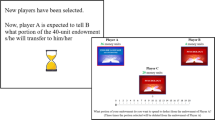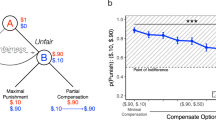Abstract
Third-party punishment (TPP) helps maintain social justice; the social preference model highlights desires to punish individuals who violate fairness and group norms. Third-party punishment affects bystanders’ trust in punishers, but the effects of group factors are currently unknown. The current study assessed how the group condition between the punished and bystanders influences how third-party punishment affects bystander trust, using third-party punishment and trust game paradigms. A pre-experiment (N = 63) showed that third-party punishment affected trust between participants and the punisher. Study 1 (N = 164) showed that TPP improved trust between participants and an out-group punisher, whereas trust decreased under an in-group condition. Study 2 (N = 128) showed that increased trust was the result of increased perceived integrity of an out-group punisher by bystanders. Decreased in-group trust was the result of decreased benevolence consciousness. Third-party punishment only enhanced bystanders’ trust for an out-group punisher, while the in-group condition revealed the opposite result.





Similar content being viewed by others
Data Availability
The datasets generated during the current study are available from the corresponding author on reasonable request.
References
Carlsmith, K. M., Darley, J. M., & Robinson, P. H. (2002). Why do we punish?: Deterrence and just deserts as motives for punishment. Journal of Personality and Social Psychology, 83(2), 284–299. https://doi.org/10.1037/0022-3514.83.2.284
Cesarini, D., Dawes, C. T., Fowler, J. H., Johannesson, M., Lichtenstein, P., & Wallace, B. (2008, Mar 11). Heritability of cooperative behavior in the trust game. Proceedings of the National Academy of Sciences of the United States of America, 105(10), 3721–3726. ://WOS:000253930600013 https://www.pnas.org/content/pnas/105/10/3721.full.pdf
Chavez, A. K., & Bicchieri, C. (2013). Third-party sanctioning and compensation behavior: Findings from the ultimatum game. Journal of Economic Psychology, 39, 268–277. https://doi.org/10.1016/j.joep.2013.09.004
Colquitt, J. A., Scott, B. A., & LePine, J. A. (2007). Trust, trustworthiness, and trust propensity: a meta-analytic test of their unique relationships with risk taking and job performance. Journal of Applied Psychology, 92(4), 909–927. https://doi.org/10.1037/0021-9010.92.4.909
Delton, A. W., & Krasnow, M. M. (2017). The psychology of deterrence explains why group membership matters for third-party punishment. Evolution and Human Behavior, 38(6), 734–743. https://doi.org/10.1016/j.evolhumbehav.2017.07.003
Faul, F., Erdfelder, E., Lang, A. G., & Buchner, A. (2007). G*Power3: A flexible statistical power analysis program for the social, behavioral, and biomedical sciences. Behavior Research Methods, 39, 175–191. https://doi.org/10.3758/BF03193146
Fehr, E., & Gächter, S. (2002). Altruistic punishment in humans. Nature, 415, 137–140. https://www.nature.com/articles/415137a
Fehr, E., & Fischbacher, U. (2004). Third-party punishment and social norms. Evolution and Human Behavior, 25(2), 63–87. https://doi.org/10.1016/s1090-5138(04)00005-4
Frederickson, N. L., & Simmonds, E. A. (2008). Special Needs, Relationship Type and Distributive Justice Norms in Early and Later Years of Middle Childhood. Social Development, 17(4), 1056–1073. https://doi.org/10.1111/j.1467-9507.2008.00477.x
He, J., & Zi, H. (2019). Self-others overlap and related concepts. Advances in Psychological Science, 27(7), 1238–1247. https://doi.org/10.3724/sp.J.1042.2019.01238
Hugh-Jones, D., Ron, I., & Zultan, R. (2019). Humans reciprocate by discriminating against group peers. Evolution and Human Behavior, 40(1), 90–95. https://doi.org/10.1016/j.evolhumbehav.2018.08.005
Jordan, J. J., Hoffman, M., Bloom, P., & Rand, D. G. (2016). Third-party punishment as a costly signal of trustworthiness. Nature, 530(7591), 473–. https://doi.org/10.1038/nature16981
Kanamori, Y., Xu, Y. J., Harrell-Williams, L. M., & Lightsey, O. R. Jr. (2022, Apr 1). Intergroup Contact, Intergroup Anxiety, and Anti-Transgender Prejudice: An Examination Using Structural Equation Modeling. Arch Sex Behav. https://doi.org/10.1007/s10508-021-02192-5
Kennedy, J. A., & Schweitzer, M. E. (2018). Building trust by tearing others down: When accusing others of unethical behavior engenders trust. Organizational Behavior and Human Decision Processes, 149, 111–128. https://doi.org/10.1016/j.obhdp.2018.10.001
Krasnow, M. M., Delton, A. W., Cosmides, L., & Tooby, J. (2016). Looking Under the Hood of Third-Party Punishment Reveals Design for Personal Benefit. Psychological Science, 27(3), 405–418. https://doi.org/10.1177/0956797615624469
Kurzban, R., DeScioli, P., & O’Brien, E. (2007). Audience effects on moralistic punishment. Evolution and Human Behavior, 28(2), 75–84. https://doi.org/10.1016/j.evolhumbehav.2006.06.001
Li, Z., Yu, X., & Dong, Y. (2018). The genetic basic of trust: Evidence from genes. Advances in Psychological Science, 26(7), 1204–1212. https://doi.org/10.3724/sp.J.1042.2018.01204
Liu, Y., Bian, X., Hu, Y., Chen, Y. T., Li, X., & Di Fabrizio, B. (2018). Intergroup Bias Influences Third-Party Punishment and Compensation: In-group Relationships Attenuate Altruistic Punishment. Social Behavior and Personality: an international journal, 46(8), 1397–1408. https://doi.org/10.2224/sbp.7193
Mayer, R. C., & Davis, J. H. (1999). The effect of the performance appraisal system on trust for management: A field quasi-experiment. Journal of Applied Psychology, 84(1), 123–136
Mayer, R. C., Davis, J. H., & Schoorman, F. D. (1995). An integrative model of organizational trust. Academy of Management Review, 20(3), 709–734. https://doi.org/10.5465/amr.1995.9508080335
McAuliffe, K., Jordan, J. J., & Warneken, F. (2015). Costly third-party punishment in young children. Cognition, 134, 1–10. https://doi.org/10.1016/j.cognition.2014.08.013
Moreno-Okuno, A. T., & Mosino, A. (2017). A theory of sequential group reciprocity. Latin American Economic Review, 26(1), 268–298. ://WOS:000408272400001
Nelissen, R. M. A. (2008). The price you pay: cost-dependent reputation effects of altruistic punishment. Evolution and Human Behavior, 29(4), 242–248. https://doi.org/10.1016/j.evolhumbehav.2008.01.001
Ohtsubo, Y., Masuda, F., Watanabe, E., & Masuchi, A. (2010). Dishonesty invites costly third-party punishment. Evolution and Human Behavior, 31(4), 259–264. https://doi.org/10.1016/j.evolhumbehav.2009.12.007
Pan, X., & Houser, D. (2019). Why trust out-groups? The role of punishment under uncertainty. Journal of Economic Behavior & Organization, 158, 236–254. https://doi.org/10.1016/j.jebo.2018.11.020
Guo, Q., Xu, P., Wu, R., & Hu, s. (2016). Effects of In-group Favoritism and Grade on the Altruistic Punishnment Behaviot of Primary School Students. Psychological Developement and Education, 32(4), 402–408. https://doi.org/10.16187/j.cnki.issn1001-4918
Riches, B. R. (2017). What Makes a Hero? Exploring Characteristic Profiles of Heroes Using Q-Method. Journal of Humanistic Psychology, 58(5), 585–602. https://doi.org/10.1177/0022167817716305
Stenstrom, D. M., Lickel, B., Denson, T. F., & Miller, N. (2008). The Roles of Ingroup Identification and Outgroup Entitativity in Intergroup Retribution. Personality and Social Psychology Bulletin, 34(11), 1570–1582. https://doi.org/10.1177/0146167208322999
Tajfel, H., Billig, M. G., & Bundy, R. P. (1971). Social categorization and intergroup behaviour. European Journal of Social Psychology, 1(2), 149–178
Vollan, B. (2011). The difference between kinship and friendship: (Field-) experimental evidence on trust and punishment. The Journal of Socio-Economics, 40(1), 14–25. https://doi.org/10.1016/j.socec.2010.10.003
Wang, L., & Murnighan, J. K. (2017). The Dynamics of Punishment and Trust. Journal of Applied Psychology, 102(10), 1385–1402. https://doi.org/10.1037/apl0000178
Wang, P., Liang, Y., Li, Y., & Liu, Y. (2016). The effects of characteristic perception and relationship perception on interpersonal trust. Advances in Psychological Science, 24(5), 815–823. https://doi.org/10.3724/sp.J.1042.2016.00815
Wang, P., Liu, Y. T., Liang, Y. J., & Tan, C. H. (2020). Effects of Trait Cognition and Social Relationship on Chinese Interpersonal Trust: The Role of Social Class. Psychological Development and Education, 36(4), 406–413
Funding
This work was supported by the Major Project of the National Social Science Foundation of China [grant numbers 18ZDA165], and the Open research Fund of Zhejiang Key Laboratory of Intelligent Education Technology and Application [jykf21022].
Author information
Authors and Affiliations
Contributions
Binghai Sun, Lingling Jin, Zirong Ren, and Guoan Yue designed this study. Lingling Jin and Zirong Ren collected and analyzed data. Guoan Yue, Zirong Ren and wrote the English version of the manuscript. Zirong Ren participated in drafting the paper and revised it critically for important intellectual content. All authors made substantial contributions to conception and design, acquisition of data, or analysis and interpretation of data; took part in drafting the article or revising it critically for important intellectual content; agreed to submit to the current journal; gave final approval of the version to the published; and agree to the accountable for all aspects of the work.
Corresponding authors
Ethics declarations
Declaration of competing interest
The authors declare no competing interests.
Additional information
Publisher’s Note
Springer Nature remains neutral with regard to jurisdictional claims in published maps and institutional affiliations.
Electronic supplementary material
Below is the link to the electronic supplementary material.
Rights and permissions
About this article
Cite this article
Sun, B., Jin, L., Yue, G. et al. Is a punisher always trustworthy? In-group punishment reduces trust. Curr Psychol 42, 22965–22975 (2023). https://doi.org/10.1007/s12144-022-03395-2
Received:
Revised:
Accepted:
Published:
Issue Date:
DOI: https://doi.org/10.1007/s12144-022-03395-2




